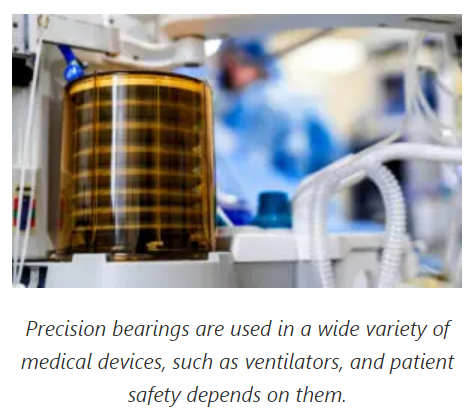Bearings for improved patient safety

Precision bearings are among critical components in medical devices that are vital to ensuring patient safety. Yet, according to the 2022 Recall Index by Sedgewick, medical device recalls have reached a record number over the last three years, with safety issues being the top reason. Here, Chris Johnson, managing director at specialist bearing supplier SMB Bearings, explains why the correct choice of suitable ball and ring materials and the right product design can ensure high-precision bearings — and medical devices — have a long service life.
Precision bearings are used in a wide variety of medical devices including surgical power tools, ventilators, and heart pumps — and patient safety depends on them all. Whatever the device, there is an onus on medical device original equipment manufacturers (OEMs) to ensure that the right type of bearings are chosen, and fit precisely into the application. This responsibility is exacerbated by the fact that the development and approval of medical products is often a protracted and costly process.
What’s more, medical devices must pass regular checks and tests for long lifecycles. That includes standards like ISO 14971, which defines the best risk reduction practices throughout a medical device’s entire lifecycle — from design and manufacturing to distribution and maintenance.
Let’s examine more closely the demands on the bearings themselves. It’s vital that OEMs make the right choice of ball and ring materials.
Stainless steel versus ceramics
Traditionally, the ring materials of bearings in medical instruments have been made from high-purity metals such as martensitic stainless steel. For example, medical robots require high-precision components to undertake keyhole surgery and centrifuges must spin at high speeds to separate substances that have different weights. Applications that require high precision or high-speed capabilities are more suited to steel bearings. Martensitic stainless steel is ideal for surgical tools, for example, because of its ability to withstand the kinds of aggressive chemicals used in sterilization processes.
However, in harsh environments, steel bearings can become susceptible to corrosion, so hard-wearing ceramic bearings are ultimately a better choice to extend the service life of the device. In these cases, ceramic bearings are preferred.
Equipment applications that are more suited to ceramic materials include Magnetic Resonance Imaging (MRI) scanners. Hospitals want to ensure their high-value machines run effectively, without the need for high-maintenance parts. Because MRI scanners use a strong magnetic field to generate two- or three-dimensional images of any living subject, standard steel bearings cannot be used due to their magnetic properties. Instead, the application requires non-magnetic or non-conductive components, in this case, quality ceramic bearings.
Full ceramic bearings are harder than steel, with superior corrosion and heat resistance, higher dimensional stability, and lower density. They are significantly more expensive than their steel counterparts — yet, overall, ceramic bearings are worth the extra investment to help ensure that high-value applications, like lab equipment, run with effectiveness and longevity. Indeed, using the wrong components in such equipment can cause contamination or cease operations altogether.
As for the choice of ball material with the bearings, plastic ball bearings are a good option for MRI scanner beds — or, indeed, any lower precision application in medical environments where there cannot be any magnetic distortion. Plastic ball bearings are also completely nonmagnetic when fitted with polymer, glass, or ceramic balls. The rings can also be made from different plastics, such as polyether ether ketone (PEEK) or polytetrafluoroethylene (PTFE). Each has outstanding chemical-resistant properties. PEEK materials, in particular, have improved corrosion and abrasion resistance, strength and toughness, X-ray radiolucency, and excellent sterilization performance.
1.The news above mentioned with detailed source are from internet.We are trying our best to assure they are accurate ,timely and safe so as to let bearing users and sellers read more related info.However, it doesn't mean we agree with any point of view referred in above contents and we are not responsible for the authenticity. If you want to publish the news,please note the source and you will be legally responsible for the news published.
2.All news edited and translated by us are specially noted the source"CBCC".
3.For investors,please be cautious for all news.We don't bear any damage brought by late and inaccurate news.
4.If the news we published involves copyright of yours,just let us know.
BRIEF INTRODUCTION
Cnbearing is the No.1 bearing inquiry system and information service in China, dedicated to helping all bearing users and sellers throughout the world.
Cnbearing is supported by China National Bearing Industry Association, whose operation online is charged by China Bearing Unisun Tech. Co., Ltd.
China Bearing Unisun Tech. Co., Ltd owns all the rights. Since 2000, over 3,000 companies have been registered and enjoyed the company' s complete skillful service, which ranking many aspects in bearing industry at home and abroad with the most authority practical devices in China.

